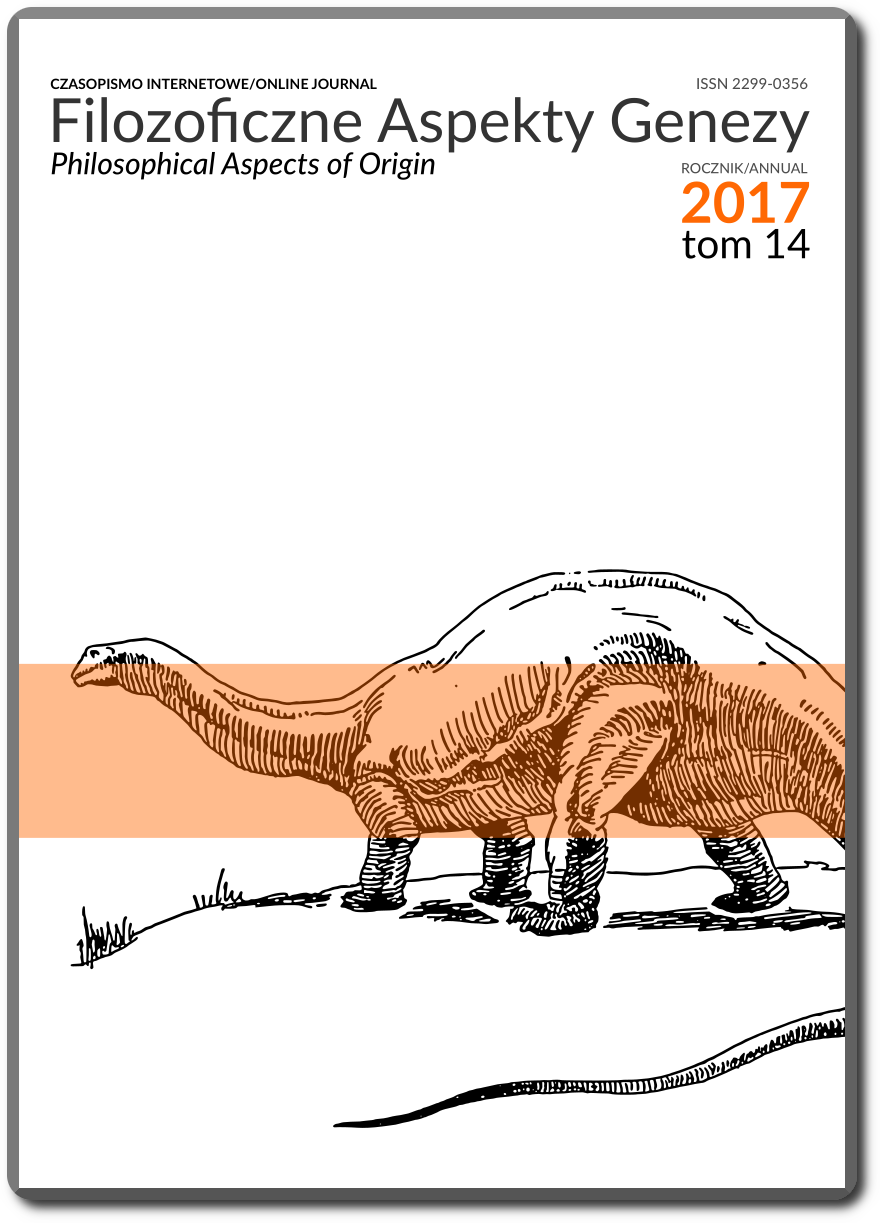Opublikowane 24.05.2021
Słowa kluczowe
- kreacjonizm,
- Karol Darwin,
- deizm,
- boska interwencja,
- teoria ewolucji
- naturalizm,
- platonizm ...More

Utwór dostępny jest na licencji Creative Commons Uznanie autorstwa 4.0 Międzynarodowe.
Jak cytować
Abstrakt
Darwinowską teorię ewolucji zwykle postrzega się jako zgodną z wymogami naturalizmu metodologicznego, jak jednak można pogodzić to z faktem, że w O powstawaniu gatunków Darwin wielokrotnie mówił o Bogu? Odpowiedź na to pytanie łączę z objaśnieniem znaczenia naturalizmu metodologicznego. Przy okazji zastanawiam się, czy twierdzenia dotyczące istot nadnaturalnych są kiedykolwiek testowalne i czy uprawianie nauki byłoby niemożliwe, gdyby porzucono naturalizm metodologiczny. Inne pytanie dotyczy tego, czy teoria Darwina oraz jej współczesne następczynie są niezgodne z izolowanymi aktami boskiej interwencji, a kolejne brzmi: jeśli liczby rozumiane są na sposób platoński (jako istniejące poza czasem i przestrzenią), to czy tym samym współczesna zmatematyzowana teoria ewolucji sprzeniewierza się naturalizmowi metodologicznemu?
Downloads
Bibliografia
- Ayala Francisco J., Dar Karola Darwina dla nauki i religii, przeł. Piotr Dawidowicz, Wydawnictwa Uniwersytetu Warszawskiego, Warszawa 2009.
- Bacon Francis, Advancement of Learning, ed. Joseph Devey, P.F. Collier and Son, New York 1901.
- Behe Michael J., Czarna skrzynka Darwina. Biochemiczne wyzwanie dla ewolucjonizmu, przeł. Dariusz Sagan, Biblioteka Filozoficznych Aspektów Genezy, t. 4, Wydawnictwo MEGAS, Warszawa 2008.
- Brooke John Hedley, „Darwin and Victorian Christianity”, w: Hodge and Radick (eds.), The Cambridge Companion to Darwin…, s. 192-213.
- Brooke John Hedley, Science and Religion: Some Historical Perspectives, Cambridge University Press, New York 1991.
- Carnap Rudolf, Empiryzm, semantyka, ontologia, przeł. Artur Koterski, Wykłady Filozoficzne, t. 7, Wydawnictwo IFiS PAN, Warszawa 2005.
- Clifford William K., „The Ethics of Belief”, w: Clifford, The Ethics of Belief…, s. 71-96.
- Clifford William K., The Ethics of Belief and Other Essays, Prometheus, Amherst, New York 1999 (1872).
- Curd Martin and Psillos Stathis (eds.), The Routledge Companion to Philosophy of Science, Routledge, London 2008.
- Cushing James T., Delaney Cornelius F., and Gutting Gary (eds.), Science and Reality: Recent Work in the Philosophy of Science, Notre Dame University Press, South Bend, Indiana 1984.
- Darwin Charles, On the Origin of Species: A Variorum Edition, ed. Morse Peckham, University of Pennsylvania Press, Philadelphia 1959.
- Darwin Francis (ed.), The Life and Letters of Charles Darwin, vol. 1-3, Murray, London 1887.
- Darwin Karol, Autobiografia i wybór listów. Dzieła wybrane, t. 8, przeł. A. Iwanowska, A. Krasicka, J. Półtowicz i S. Skowron, Biblioteka Klasyków Biologii, Państwowe Wydawnictwo Rolnicze i Leśne, Warszawa 1960.
- Darwin Karol, O powstawaniu gatunków drogą doboru naturalnego, czyli o utrzymaniu się doskonalszych ras w walce o byt, przeł. Szymon Dickstein i Józef Nusbaum, Ediciones Altaya Polska & DeAgostini Polska, Warszawa 2001.
- Darwin Karol, O powstawaniu gatunków drogą doboru naturalnego, czyli o utrzymaniu się doskonalszych ras w walce o byt, tekst polski na podstawie przekładu Szymona Dicksteina i Józefa Nusbauma opracowały Joanna Popiołek i Małgorzata Yamazaki, Wydawnictwa Uniwersytetu Warszawskiego, Warszawa 2009.
- Diaconis Persi, „A Place for Philosophy: The Rise of Modeling in Statistical Science”, Quarterly of Applied Mathematics 1998, vol. 56, s. 797-805.
- Dilley Stephen, „Charles Darwin’s Use of Theology in the Origin of Species”, British Journal for the History of Science 2012, vol. 45, no. 1, s. 29-56.
- Draper Paul, „God, Science, and Naturalism”, w: Wainwright (ed.), The Oxford Handbook of Philosophy of Religion…, s. 272-303.
- Edwards Paul (ed.), The Encyclopedia of Philosophy, vol. 1, Macmillan, New York 1967.
- Gillespie Neal C., Darwin and the Problem of Creation, University of Chicago Press, Chicago 1971.
- Gould Stephen Jay, „The Panda’s Thumb”, w: Gould, The Panda’s Thumb…, s. 19-26.
- Gould Stephen Jay, The Panda’s Thumb, Norton, New York 1980.
- Gray Asa, Darwiniana, Harvard University Press, Cambridge, Massachusetts 1963 (1888).
- Gray Asa, „Natural Selection Not Inconsistent with Natural Theology”, w: Gray, Darwiniana…, s. 72-145.
- Hájek Alan, „What Conditional Probabilities Could Not Be”, Synthese 2003, vol. 137, s. 273-323.
- Heidelberger Michael, Krueger Lorenz, and Rheinwald Rosemarie (eds.), Probability Since 1800: Interdisciplinary Studies of Scientific Development, University of Bielefeld, Bielefeld 1983.
- Hempel Carl G., Aspects of Scientific Explanation and Other Essays in the Philosophy of Science, Free Press, New York 1965.
- Hempel Carl G., „Studies in the Logic of Confirmation”, w: Hempel, Aspects of Scientific Explanation…, s. 3-47.
- Hitchcock Christopher and Sober Elliott, „Prediction Versus Accommodation and the Risk of Overfitting”, British Journal for the Philosophy of Science 2004, vol. 55, no. 1, s. 1-34.
- Hodge Jonathan and Radick Gregory (eds.), The Cambridge Companion to Darwin, Cambridge University Press, Cambridge 2003.
- Hodge Michael J.S., „Law, Cause, Chance, Adaptation and Species in Darwinian Theory in the 1830’s, with a Postscript on the 1930’s”, w: Heidelberger, Krueger, and Rheinwald (eds.), Probability Since 1800…, s. 287-330.
- Huxley Thomas H., „Agnosticism”, w: The Major Prose of Thomas Henry Huxley…, s. 253-282.
- Huxley Thomas H., Collected Essays, vol. 1, Macmillan, London 1893-1894 (1866).
- Huxley Thomas H., Essays upon Some Controverted Questions, Macmillan, London 1892.
- Huxley Thomas H., „On Improving Natural Knowledge”, w: Huxley, Collected Essays…, s. 18-41.
- Jodkowski Kazimierz (red.), Teoria inteligentnego projektu — nowe rozumienie naukowości?, Biblioteka Filozoficznych Aspektów Genezy, t. 2, Wydawnictwo MEGAS, Warszawa 2007, http://www.nauka-a-religia.uz.zgora.pl/images/Przedruki/Jodkowski_red._Teoria.ID.nowe.rozumienie.naukowosci.pdf (02.02.2018).
- Johnson Phillip E., Evolution as Dogma: The Establishment of Naturalism, Haughton, Dallas, Texas 1990.
- Kvanvig Jonathan L. (ed.), Oxford Studies in Philosophy of Religion, vol. 3, Oxford University Press, Oxford 2010.
- Laudan Larry, „Zgon problemu demarkacji”, przeł. Artur Koterski, w: Muszyński (red.), Z badań nad prawdą, nauką i poznaniem…, s. 63-79.
- Lindberg David C. and Numbers Ronald L. (eds.), When Science and Christianity Meet, University of Chicago Press, Chicago 2003.
- List Karola Darwina do Asy Graya z 22 maja 1860 roku, w: Darwin, Autobiografia i wybór listów…, s. 216-217.
- List Karola Darwina do M.E. Boole z 14 grudnia 1866 roku, w: Darwin, Autobiografia i wybór listów…, s. 293.
- Miller Kenneth R., Finding Darwin’s God: A Scientist’s Search for Common Ground between God and Evolution, HarperCollins, New York 2007.
- Monod Jacques, Przypadek i konieczność. Esej o filozofii biologii współczesnej, przeł. Jędrzej Bukowski, Biblioteka „Głosu”, Warszawa 1979.
- Moore James R. (ed.), History, Humanity and Evolution: Essays for John C. Greene, Cambridge University Press, Cambridge 1989.
- Moore James R., „Of Love and Death: Why Darwin «Gave Up» Christianity”, w: Moore (ed.), History, Humanity and Evolution…, s. 195-230.
- Mossner Ernest C., „Deism”, w: Edwards (ed.), The Encyclopedia of Philosophy…, s. 326-336.
- Muszyński Zbysław (red.), Z badań nad prawdą, nauką i poznaniem, Realizm. Racjonalność. Relatywizm, t. 31, Wydawnictwo Uniwersytetu Marii Curie-Skłodowskiej, Lublin 1998.
- Nelson Paul, „The Role of Theology in Current Evolutionary Reasoning”, Biology and Philosophy 1996, vol. 11, s. 493-517.
- Numbers Ronald L., „Science without God: Natural Law and Christian Beliefs, an Essay on Methodological Naturalism”, w: Lindberg and Numbers (eds.), When Science and Christianity Meet…, s. 265-286.
- Numbers Ronald L., The Creationists: From Scientific Creationism to Intelligent Design, Harvard University Press, Cambridge, Massachusetts 2006.
- Numbers Ronald L. and Alexander Denis R. (eds.), Biology and Ideology from Descartes to Dawkins, University of Chicago Press, Chicago 2010.
- Pennock Robert T., „Can’t Philosophers Tell the Difference between Science and Religion?: Demarcation Revisited”, w: Pennock and Ruse (eds.), But Is It Science…, s. 536-577.
- Pennock Robert T., Tower of Babel: The Evidence against the New Creationism, MIT Press, Cambridge, Massachusetts 1999.
- Pennock Robert T. and RUSE Michael (eds.), But Is It Science?: The Philosophical Question in the Creation/Evolution Controversy, updated edition, Prometheus Books, Amherst, New York 2009.
- Plantinga Alvin, „Naturalizm metodologiczny?”, przeł. Radosław Plato, Filozoficzne Aspekty Genezy 2014, t. 11, s. 37-93, http://www.nauka-a-religia.uz.zgora.pl/images/FAG/2014.t.11/art.03.pdf (29.01.2018).
- Popper Karl R., Logika odkrycia naukowego, przeł. Urszula Niklas, Wydawnictwo Naukowe PWN, Warszawa 2002.
- Popper Karl R., „Replies to My Critics”, w: Schilpp (ed.), The Philosophy of Karl Popper…, s. 961-1200.
- Quinn Philip L., „The Philosopher of Science as Expert Witness”, w: Cushing, Delaney, and Gutting (eds.), Science and Reality…, s. 32-53.
- Radick Gregory, „Deviance, Darwinian-Style: A Review of A. Lustig, R. Richards, and M. Ruse’s Darwinian Heresies”, Metascience 2005, vol. 14, s. 453-457.
- Reichenbach Hans, Experience and Prediction, University of Chicago Press, Chicago 1938.
- Ruse Michael, Darwinism Defended, Addison-Wesley, Reading, Massachusetts 1982.
- Ruse Michael and Richards Robert J. (eds.), The Cambridge Companion to the Origin of Species, Cambridge University Press, Cambridge 2009.
- Russell Robert John, Cosmology: From Alpha to Omega: The Creative Mutual Interaction of Theology and Science, Fortress Press, Philadelphia 2008.
- Schilpp Paul A. (ed.), The Philosophy of Karl Popper, Open Court, Chicago 1977.
- Sober Elliott, „Co jest nie tak z Inteligentnym Projektem?”, przeł. Michał Nowosad, w: Jodkowski (red.), Teoria inteligentnego projektu…, s. 181-189.
- Sober Elliott, „Empiricism”, w: Curd and Psillos (eds.), The Routledge Companion to Philosophy of Science…, s. 129-138.
- Sober Elliott, Evidence and Evolution: The Logic Behind the Science, Cambridge University Press, Cambridge 2008.
- Sober Elliott, „Evolution without Naturalism”, w: Kvanvig (ed.), Oxford Studies in Philosophy of Religion…, s. 187-121.
- Sober Elliott, „Parsimony Arguments in Science and Philosophy”, Proceedings and Addresses of the American Philosophical Association 2009, vol. 83, s. 117-155.
- Sober Elliott, „Teoria inteligentnego projektu a nadnaturalizm — o tezie, że projektantem może być Bóg lub istoty pozaziemskie”, przeł. Sławomir Piechaczek, Filozoficzne Aspekty Genezy 2007/2008, t. 4/5, s. 21-39, http://www.nauka-a-religia.uz.zgora.pl/images/FAG/2007-2008.t.4-5/art.06.pdf (21.01.2018).
- The Major Prose of Thomas Henry Huxley, ed. Alan P. Barr, University of Georgia Press, Athens 1997 (1889).
- Topham Jonathan R., „Biology in the Service of Natural Theology: Paley, Darwin, and the Bridgewater Treatises”, w: Numbers and Alexander (eds.), Biology and Ideology…, s. 88-113.
- Turner Frank M., Between Science and Religion: The Reaction to Scientific Naturalism in Late Victorian England, Yale University Press, New Haven, Connecticut 1974.
- Wainwright William (ed.), The Oxford Handbook of Philosophy of Religion, Oxford University Press, Oxford 2004.
- Whewell William, On Astronomy and General Physics Considered with Reference to Natural Theology, 7th ed., Treatise III, William Pickering, London 1839.



